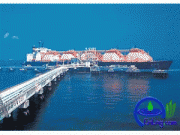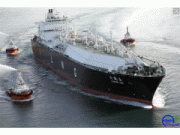A joint industry project focused on the use of liquefied natural gas (LNG) on the West Coast aims to identify and address barriers for LNG as a marine fuel in Canada. The estimated $1.2 million project involves 17 participating organizations including Port Metro Vancouver, BC Ferries, Seaspan, and the British Columbia Institute of Technology along with marine classification societies, technology and services providers, standards development groups, federal and provincial governments, and natural gas producers and suppliers.
Stringent emissions regulations coming into force in 2015-2016 mean that vessel owners operating within 200 miles of the West Coast and in other regions of Canada will need to use lower sulphur distillate fuel, install exhaust aftertreatment technologies or switch to LNG in order to comply. LNG offers significant air quality benefits producing 80% lower NOx and particulate matter, and a 90% reduction in SOx emissions. LNG can also reduce greenhouse gas emissions by up to 25% from ships.
"Our government is pleased to work with partners to determine how LNG can be used as a safe and environmentally responsible marine fuel on the West Coast of Canada," said the Honourable James Moore, Minister Responsible for British Columbia and Minister of Canadian Heritage and Official Languages. "In addition, results of this work will be applicable to similar initiatives in the Great Lakes and St. Lawrence Seaway, as well as the East Coast of Canada."
"LNG bunkering is being considered by major ports around the world as one way to reduce emissions and enhance sustainability," said Duncan Wilson, Vice President, Corporate Social Responsibility, Port Metro Vancouver, "We are committed to growing Canada's largest Gateway to the Asia Pacific in a sustainable way and LNG offers the potential to improve environmental performance and enhance our competitive position."
BC Ferries sees LNG as a viable alternative to marine diesel fuel. "While we already use low sulphur diesel, we are taking it to the next level by exploring the use of alternative fuels to reduce costs and lessen the environmental impact of our operations," according to Mike Corrigan, President and CEO. "LNG is an attractive option as it offers fuel savings and emissions reductions through the use of an abundant local resource."
Launched in late 2012, the West Coast Marine LNG project will conclude with the release of a final report in November 2013 documenting technology readiness, training, safe operations and regulatory requirements, and environmental and economic benefits from a Canadian point of view. The project is supported by the Government of Canada under the direction of the Canadian Natural Gas Vehicle Alliance (CNGVA) who is playing a lead role in coordinating participation and resource contributions. The CNGVA is Canada's national trade association that
advocates for greater use of natural gas as a primary transportation fuel for the benefit of Canada's economy and environment.















